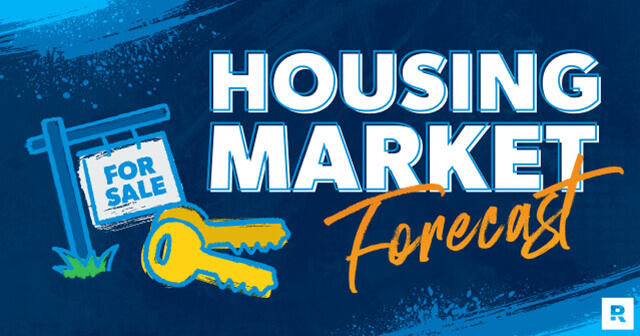Housing Market Predictions for 2025
9 Min Read | Feb 13, 2025

Key Takeaways
- Interest rates for 30-year mortgages should stabilize around 6.5% in 2025.
- A housing market crash is not on the horizon.
- Housing inventory will likely still be low in 2025, and demand could increase.
- If you’re financially ready to buy now, don’t wait.
If you’re thinking about buying or selling a house and wondering about the housing market, you’re not the only one. The real estate market has seen a lot of unusual trends in the past couple of years, so it makes sense that you’d want the latest market update before you make any major decisions.
Here’s the thing: Housing market predictions are about as reliable as weather forecasts. The real estate professionals make their best predictions based on data, but no one can know what’s going to happen with 100% accuracy.
Still, even though the housing market is uncertain, you can listen to what the experts are saying and make some pretty good guesses. Just remember—never let a market prediction control your housing decisions. Only your personal situation and finances should do that!
With that said, here’s the real estate market forecast.
Will Interest Rates Go Down in 2025?
Mortgage interest rates finally began to fall at the end of 2023 and into 2024, after going way up for two straight years. How much did they fall? The average rate for a 30-year fixed-rate mortgage hit a high point of 7.79% in October 2023 but started February 2025 at 6.89%.1
Now, the big question on everyone’s mind is whether rates will keep falling in 2025. The answer? Maybe, but probably not by much. The Mortgage Bankers Association (MBA) is projecting that 30-year mortgage rates will stabilize around the 6.5% mark for the foreseeable future.2
That means you shouldn’t wait around for interest rates to go down. If you’re financially ready to buy, go ahead and get the process started.
Is Now a Good Time to Buy a House?
Like I said before, the market shouldn’t determine your decision to buy a house. If you’re prepared financially, then it’s a good time to buy a home, even if inventory is limited and interest rates are high. If you’re not prepared financially, it’s not a good time, even if there’s plenty of inventory and rates are down.
You’re ready to buy a house in 2025 if (and only if) you can check off all these boxes:
- You’re debt-free.
- You have an emergency fund of 3–6 months of expenses.
- Your monthly house payment on a 15-year fixed-rate mortgage will be 25% or less of your monthly take-home pay. (Steer clear of FHA and VA loans—you’ll pay much more in fees with them.)
- You have a down payment. A 20% down payment is ideal because you’ll avoid paying private mortgage insurance (PMI). But 5–10% is okay if you’re a first-time home buyer (just be prepared to pay PMI).
- You can pay the closing costs up front without stealing from your down payment.
If you don’t meet these qualifications, it doesn’t matter if the market is in your favor. Buying a home would be a burden instead of a blessing. Take your time to get in a better financial position so you can buy a house the right way.
If you are ready to buy, then it’s time to hire an agent and get to work! The best place to find an awesome real estate pro is our RamseyTrusted® program. We only recommend agents who prioritize you and your goals—not their bottom line.
How Will the Housing Market Change Under a New President?
If you’re wondering how President Donald Trump will affect the housing market, the most important thing to understand is that presidents don’t directly control interest rates or housing prices—it’s all about supply and demand (we’ll talk more about that later). That means there’s only so much a new president can do to make housing more affordable.
Find expert agents to help you buy your home.
That said, Trump does want to implement policies that could increase supply and move the needle at least a little bit. Specifically, he’s talked about wanting to make adjustments in three major areas: zoning, infrastructure and federal land policies.
- Zoning laws decide how land can be used—whether for homes, businesses or even parks. Too many zoning laws can decrease housing supply and drive prices up, while flexible zoning laws open the door for more development and investment opportunities.
- Infrastructure refers to things like roads, public transportation and schools—and it can directly impact home values. Good infrastructure makes an area more desirable, which raises property values. If a city invests in new transit lines, highways or parks, nearby properties often see a boost.
- When the government opens federal land for private development, that can also shape real estate markets. The land might be used for housing, commercial projects or even renewable energy. Having more land available can ease housing shortages and lower prices.
At the end of the day, just remember that you have a lot more control over your money than any politician does. Even if home prices come down under Trump, it’ll still be your job to pay off your debt, build an emergency fund, and save up a strong down payment. What happens in your house is way more important than what happens in the White House!
Want More Expert Real Estate Advice?
Sign up for our newsletter! It’s packed with practical tips to help you tackle the housing market and buy or sell your home with confidence—delivered straight to your inbox twice a month!
What’s the Average House Price?
The average home sales price in the U.S. is $510,300 according to the most recent numbers from the end of 2024.3 But it’s typically more helpful to look at the median sales price, which is $419,200.4
Why? Because a small group of super high- or low-priced houses can throw off the average and make regular homes seem more or less expensive than they really are (something to keep in mind as you watch the average house price fluctuate in 2025). The median price, on the other hand, is the number right in the middle of all the prices.
Will the Housing Market Crash in 2025?
If you’re concerned about the housing market crashing in 2025, you can put those worries to rest. Prices are not going to start drastically going down anytime soon. In fact, the Federal Home Loan Mortgage Corporation expects prices to grow in 2025.5
The main thing to know about the housing market is that home prices are determined by inventory (also known as supply) and demand. Here’s what you can expect in each of those areas.
Housing Inventory
Housing inventory simply refers to the number of houses for sale. When fewer houses are available, buyers are willing to pay more, and sellers have more leverage to up their asking price. Simply put—low inventory leads to higher home prices. It’s a big reason why buying a home has gotten so expensive.
When it comes to housing inventory for 2025, things are currently looking up! January 2025 marked the 15th straight month of inventory growth. Even better news: The number of homes on the market in January was 24.6% higher than a year earlier.6
Now, while inventory is increasing, it’s still nowhere close to pre-COVID levels. So you shouldn’t get your hopes up about seeing any kind of major price adjustment. But this is still a great sign because it means the market is getting healthier overall.
Buyer Demand
Buyer demand in real estate simply refers to how many people are looking to buy a home—and how eager they are. The best way to gauge demand in the market is by how many homes sell for more than their listing prices. In January 2025, that number was 22.4%.7
Overall, buyer demand has stayed steady over the last two years. Since 2022, demand has gone up during the summer and down during the winter (rinse and repeat). We could see demand increase in 2025, though, if interest rates get lower.
With the right agent, taking on the housing market can be easy.
Buy or sell your home with an agent the Ramsey team trusts.
What Does the 2025 Housing Market Mean for Buyers and Sellers?
Is It a Buyer’s Market?
In a buyer’s market, the number of homes for sale is more than the number of buyers. But since home supply is still low, it doesn’t look like there’ll be a buyer’s market anytime soon.
The good news is, the market isn’t as hot as it was in the past few years. If you’re looking to buy, you’ll have a few more options—and maybe less competition. Yes, prices are still high, but the frenzy has slowed down.
Is It a Seller’s Market?
A seller’s market is when demand for homes is higher than the supply of homes, which is still the case right now. If you’re planning to sell your house, you can expect to sell it pretty quickly and for close to your asking price—as long as your asking price is fair for the current market. (It’s easy to value your home based on happy memories and how much you loved living there, but a good agent will help you price it realistically.)
Will There Be a Lot of Foreclosures in 2025?
Foreclosures were slightly down throughout 2024, and that trend that should continue in 2025. There were 322,103 foreclosures in 2024, which represented a 10% decline from the year before.8
Here’s what that means for homeowners and home buyers:
- Homeowners: Since the market isn’t going to get flooded with foreclosures, you can rest easy, knowing your home isn’t going to tank in value because of a sudden increase in home inventory.
- Home buyers: If you’re waiting to find a great deal on a foreclosure, it’s not going to be easy. And keep in mind, buying a foreclosed home could come with its own set of potential issues. So make sure you do your homework on the house and know what you’re getting yourself into before you buy.
How to Buy or Sell With Confidence in Any Housing Market
I know buying or selling a house is a big deal, especially after all the craziness we’ve seen in the market over the last few years, but you’ve got this!
Yes, the cost of buying a house is higher than it’s ever been before. And yes, selling a home in 2025 will come with obstacles—like high interest rates and home values pricing out a lot of would-be buyers. But even though buying or selling may be more difficult now than it was a couple years back, it’s not impossible.
You still control your financial future. That includes real estate—no matter what’s going on in the market. And our team here at Ramsey always has your back.
If you want to learn even more about buying or selling a house, check out our all-new Real Estate Home Base! It’s full of super helpful articles, guides and calculators—basically everything you need to make confident decisions and reach your home goals. Think of it as your all-in-one real estate resource.
Did you find this article helpful? Share it!

We Hear You!
We’re considering adding the ability to save articles to your Ramsey account.





